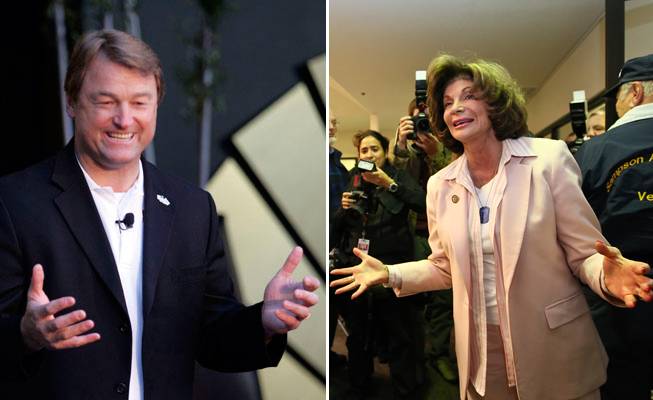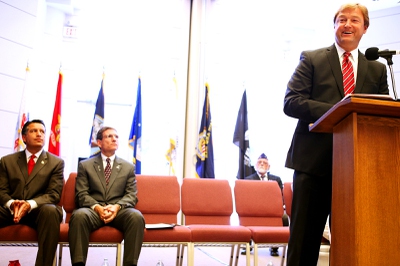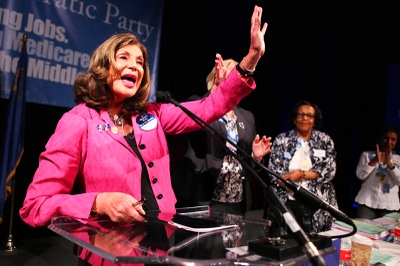
Sam Morris and Mona Shield Payne/Las Vegas Sun
Left: Dean Heller speaks at the grand opening of the Mandarin Oriental at CityCenter on Dec. 4, 2009. Right: Shelley Berkley laughs with constituents during a “Congress on the Corner” event Jan. 14, 2011, at her Las Vegas office.
Tuesday, June 12, 2012 | 2 a.m.
SHELLEY BERKLEY:
2011
Total gross income: $1,235,046
Taxable income: $864,747
Taxes paid: $230,547
Effective tax rate: 19 percent
Charitable giving: $54,396
DEAN HELLER:
2011
Total gross income: $258,993
Taxable income: $104,503
Taxes paid: $17,639
Effective tax rate: 7 percent
Charitable giving: $19,170
Sun coverage
As a politician, Shelley Berkley opposes cutting the capital gains tax rate. As a taxpayer, maybe she should vote for Dean Heller.
More than 20 percent of the taxable income Berkley and her husband, Dr. Larry Lehrner, made last year came from capital gains, which are taxed at a lower rate than typical salaries and wages — and which Heller would like taxed even less.
The couple, which reported $1.2 million in total income, should be in the highest tax bracket — 35 percent.
Their effective tax rate — after accounting for capital gains and a slew of different investing strategies, tax exemptions and deductions — wound up being 19 percent last year.
By contrast, Heller’s tax return reads more like a typical middle-class family’s might — his income notwithstanding. He takes advantage of child tax credits, Making Work Pay credits, education credits for his kids in college and home mortgage deductions.
But he also bought a farm two years ago, which allowed him to shave nearly $7,000 from his income before calculating his tax last year. Heller and his family also enjoy more than $45,000 a year tax free from his wife’s family trust, which invests in tax-exempt government bonds.
With a total gross income of nearly $260,000 a year, Heller should be in the second-highest tax bracket of 33 percent.
Instead, his effective tax rate was a scant 7 percent last year.
Heller, a Republican, and Berkley, a Democrat, are in a tight race for the U.S. Senate this year.
In an unprecedented move, both candidates agreed to share three years of their personal income tax returns with the Las Vegas Sun. No major Senate candidate in Nevada has made his or her tax returns public in the past.
But how candidates pay their taxes has become more of a focus in national campaigns this cycle, particularly in the presidential race.
Republican presidential candidate Mitt Romney spent weeks dodging requests for his returns before finally releasing two years worth of information. The multimillionaire has been criticized for paying an effective tax rate of less than 14 percent.
Like Berkley, much of Romney’s income is from capital gains.
Candidates in the fierce battle for U.S. Senate in Massachusetts have also released their returns.
In addition to the transparency on their personal finances, the returns offer a bit of context for the candidates’ positions on tax policy.
Perhaps ironically, neither of their public positions necessarily square with their personal economic interests.
Berkley’s family could stand to benefit from a lowering of the capital gains rate. She and her husband have a robust portfolio of stocks, which is managed by Morgan Stanley Smith Barney. The couple’s portfolio manager has complete control over investment and buy-sell decisions within that portfolio.
Berkley and her husband also invest in nearly two dozen limited liability corporations and partnerships — business entities that offer a variety of strategies, mostly employed by the wealthy, for limiting tax exposure.
Lehrner is a partner in a number of medical partnerships. His investment choices reflect diversity, including a metal finishing company and a yogurt shop franchise.
Berkley has repeatedly voted against efforts to lower the capital gains tax. She also supports the so-called Buffett rule, which would impose a 30 percent tax rate on those who earn more than $1 million a year.
Depending on how those earnings are calculated, it’s possible Berkley’s family would fall under the rule. (Berkley’s adjusted gross revenue came in just under $1 million last year. Her total gross revenue, however, was $1.2 million.)
Berkley declined to be interviewed for this story but sent a written statement in response to questions — though she declined to answer all of them.
“The president and I both share the same deeply held commitment to making sure we have a fair tax system, which guarantees middle-class Nevada families are not paying a higher tax rate than Wall Street millionaires, big oil company executives and hedge fund managers,” Berkley said.
Heller, on the other hand, has consistently opposed efforts to increase the capital gains rate — even though his family doesn’t benefit quite as much from it.
Last year, Heller and his wife earned $7,400 in capital gains — compared with the $190,000 in capital gains and qualified dividends earned by Berkley’s family.
Instead, the biggest boon to Heller’s tax bill is the tax-exempt interest from his wife’s family’s trust and the write-offs from the alfalfa farm they bought two years ago.
“Business expenses are always a write-off,” Heller said. “What I’m doing is typical of what 80 percent of businesses in America do.”
Indeed, Heller’s focus on tax policy is business-centric.
“I’m a low-tax, small-government, free-market Republican,” he said. “I want to keep taxes as low as possible. I want to do something very different than (Berkley’s) economic policies.”
Heller refused to “talk about specific tax rates” but acknowledged he wants to cut the corporate tax rate and lower capital gains rates in order to boost business confidence and free up money for them to invest.
He argued Berkley’s economic policies hit the very people she says she is trying to help the most.
“No one has been hurt more in this economy than women, the middle class, Hispanics and students,” he said. “They are getting creamed in this economy.”
Berkley disputed Heller’s assertion, arguing he supports tax credits for “companies that send jobs overseas” while she supports developing clean energy jobs.
Both Berkley and Heller have fared well in the economic recession.
Over the past three years, Berkley’s family income has grown by 8 percent. Heller has seen his income grow 20 percent — mostly because of the farm income and stronger capital gains.
Both candidates also give a significant amount of money to charity. Heller routinely gives about $20,000 a year, mostly to the Church of Jesus Christ of Latter-day Saints.
In the past three years, Berkley has given from $46,000 to $82,000 to charity.



Join the Discussion:
Check this out for a full explanation of our conversion to the LiveFyre commenting system and instructions on how to sign up for an account.
Full comments policy